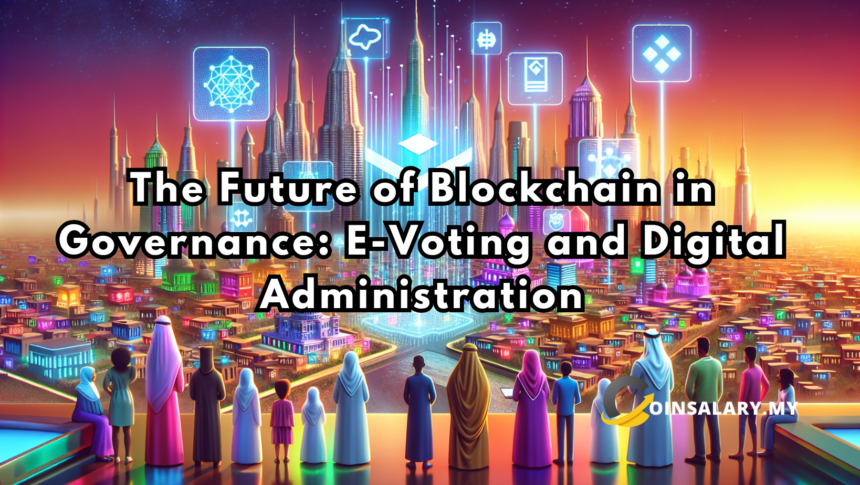Blockchain technology, originally conceived as the backbone of cryptocurrencies, has emerged as a transformative force across industries, including governance. Governments worldwide are exploring its potential to revolutionize public administration, particularly in two key areas: electronic voting (e-voting) and digital administration. This article delves into how blockchain can redefine these aspects of governance, the challenges involved, and the future outlook.
Blockchain and Its Relevance to Governance
Blockchain is a decentralized, immutable ledger that securely records transactions and information. Its core features—transparency, security, and decentralization—align closely with the goals of modern governance: efficiency, accountability, and inclusivity.
In governance, blockchain can address persistent issues such as electoral fraud, corruption, bureaucratic inefficiency, and lack of transparency. By enabling secure and verifiable systems, blockchain has the potential to restore trust in institutions and enhance citizen engagement.
E-Voting: Securing Democratic Processes
E-voting has long been viewed as a way to increase voter participation, reduce logistical costs, and streamline election processes. However, traditional e-voting systems are often criticized for vulnerabilities in security and lack of transparency. Blockchain offers a solution to these challenges.
- Transparency and Auditability
Blockchain’s immutable ledger ensures that all votes are recorded transparently and can be audited without compromising voter anonymity. Every transaction (vote) is timestamped and linked to previous transactions, creating an unchangeable record. - Enhanced Security
Traditional e-voting systems are susceptible to hacking and data breaches. Blockchain’s decentralized nature eliminates single points of failure, making it significantly harder for malicious actors to manipulate results. Cryptographic techniques further ensure the integrity of votes. - Voter Accessibility
Blockchain-based e-voting can enable remote participation through secure digital identities, making it easier for citizens, including those living abroad, to exercise their right to vote. This can significantly improve turnout rates in elections. - Case Studies
Countries such as Estonia and Switzerland have experimented with blockchain-based voting systems. For example, in Estonia, blockchain is integrated into its e-governance ecosystem, demonstrating the feasibility of secure digital elections.
Digital Administration: Streamlining Bureaucracy
Digital administration encompasses the use of technology to deliver government services efficiently. Blockchain can enhance digital administration by providing secure, transparent, and tamper-proof platforms for various public services.
- Identity Management
Blockchain can be used to create digital identities that are secure, portable, and verifiable. Citizens can store personal information on a blockchain and selectively share it with government agencies, reducing the need for repetitive data entry and paperwork. - Land and Asset Registries
Land disputes and fraudulent transactions often stem from poorly maintained records. Blockchain can maintain a transparent and immutable registry of land ownership and property transactions, reducing disputes and corruption. - Supply Chain Transparency
Governments can use blockchain to monitor public procurement processes, ensuring accountability and reducing opportunities for corruption. For example, smart contracts can automatically enforce compliance with procurement rules. - Welfare and Subsidy Distribution
Blockchain can streamline the distribution of welfare benefits, ensuring that funds reach the intended recipients without intermediaries. This reduces leakage and enhances transparency in subsidy programs.
Challenges and Barriers
Despite its potential, the adoption of blockchain in governance faces several hurdles:
- Scalability: Current blockchain systems may struggle to handle the volume of transactions required for national elections or large-scale administrative processes.
- Cost and Infrastructure: Implementing blockchain solutions requires significant investment in infrastructure, training, and system integration.
- Regulatory and Legal Frameworks: Many jurisdictions lack clear regulations on blockchain applications, which can slow adoption.
- Privacy Concerns: While blockchain ensures transparency, striking a balance between transparency and individual privacy remains a challenge.
Future Prospects
The integration of blockchain in governance is still in its infancy, but the trajectory is promising. Innovations such as Layer 2 solutions and hybrid blockchains aim to address scalability and privacy issues, making the technology more adaptable for government use.
Moreover, increasing global interest in digital governance is driving experimentation and collaboration. Initiatives like the European Blockchain Partnership (EBP) and the World Bank’s blockchain projects indicate that blockchain is moving closer to mainstream adoption in governance.
In the next decade, blockchain has the potential to redefine how governments operate, fostering greater trust, efficiency, and citizen participation. While challenges remain, the benefits of blockchain far outweigh the obstacles, making it a cornerstone of future governance.
Conclusion
Blockchain technology represents a paradigm shift in governance, particularly in e-voting and digital administration. By addressing long-standing issues of transparency, security, and inefficiency, it can transform democratic processes and public services. Governments that embrace blockchain stand to become more resilient, responsive, and inclusive, paving the way for a new era of trust and accountability.




